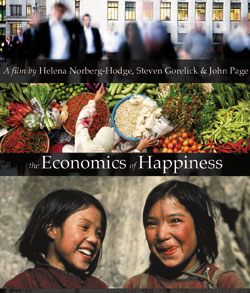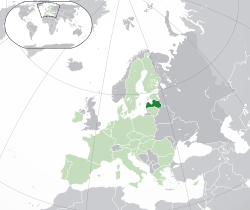"the Economics of Happiness" is a movie that shows 8 aspects of globalization.
With every next aspect the feeling in my guts got heavier and heavier, and by the time it reached last on globalization, I felt like eaten a sack of stones since all of the clothing I and my little one (who also attends these events) wear at that moment is made somewhere far away, most of it is either bought or shipped from the UK I no longer live in. Just few hours ago I had been at the store to buy groceries. Most of them organic from what's available. And all of them coming from somewhere else, since at this season locally grown produce is unavailable.
Even though I try to think of food miles when I shop, I've never thought there would exist such incredibly imbecile wasteful practices of our globalization directed economies as trade for the sake of trade: "apples sent from the UK to South Africa to be washed and waxed, then shipped back to British supermarkets; tuna caught off the coast of America, flown to Japan to be processed, then flown back to the US. ". That was something new to me. I may have known the adverse impacts on local communities and power of MNCs, effects on the environment etc. But to see a plain wasting of all possible resources like above examples. It just shocked me.
Flying food around the world has never been a good thing in my opinion, but to see that the countries have almost equal amounts of products both imported and exported makes me shiver inside. One thing is to import things you don't have and export those that you have excess to make them available to others. But just to ship it around, exporting your own potatoes just to import potatoes grown elsewhere. It's plain fooling of people. At this point, the movie really made me angry.
Also ethical issues that the globalization imposes on local people, how they think who they are and how they should be.. and not only on those in Ladakh or slums of India, but also here on the streets of our own 'West' cultures, global North- people are never enough, they never own enough or look enough.. and they are never happy. And so the intense consumerism grows just to be hip enough, just to belong..
The film nicely portrayed also the problematic of urbanization, the links between people moving into cities and energy consumption, the unresolved issues of who and how feeds the urban population etc.
But then the film moves to the positive changes we can make if we redirect our economies from globalization towards localization.
Local economy will feed the local people, but voting with your wallet may not be enough. Film inspires us to strive to change the policy towards supporting local businesses, the only question is how to do that in reality.
I really enjoyed how the trend of localisation portrayed gaining and re-gaining of identity. When you live and work in a healthy, happy community, you learn from real life role models, you get the sense of self. That is a confidence and inner security that only localization can give, only your family and near society can provide. No global advertisement will promote it or even allow it, because that will most probably mean financial losses on their part, but in local community one will thrive with it.
In such communities there's no unemployment, there's no poverty, there's no hunger. And there are no unhappy people, the ties in community between people, links with traditions and nature are strong. And localization strengthens and mends what globalization would try to break.
I also enjoyed the opinions that were not super-extreme. There are good things that come from cross-border cooperation, global spread of information, education, technologies etc. But local economies should come first. And this movie was inspiring and giving hope by showing the localization trends and actual examples on how to fix many crisis that world is currently facing due to the economic globalization.
I think also here in Latvia we currently fail in that matter. We see ourselves as patriotic, but sometimes (often it's ridiculous) the local produce costs more than imported one.. and then we must think of whether and why I'm ready to pay more for local. Do we think of food miles when we choose? Do we think of our health? Or do we think of supporting local economies form A to Z, from growing the thing to selling it?
I am. I don't eat imported apples. Ever. Period. But in winter for example there are things that I rather buy even more expensive organic from Spain (like cucumbers and tomatoes) that are grown in sunshine, rather than also expensive local ones that are grown with artificial light, synthetic nutrients and the plants haven't seen a soil in their whole existence.
But I also rather buy fresh milk from neighboring farmer that doesn't have any Eco certification rather than organic milk from another country even if available. The milk next door is always more Eco than the one shipped from somewhere. Same applies to many things- like dish washing liquid. If it's shipped from the USA, it is so not environmentally friendly anymore. If it's produced here, I'm ready to buy it even if it's more expensive. Food miles is something new in our society and people rarely think of it as a really important issue. Slowly the change is happening, but we're still far behind to think of writing actual environmental costs (production, CO2, water, food miles etc.) on the price tag. Even though that would most probably turn the consumption patterns upside down.
Buying local supports local economies. Every time you spend on local produce, whether it's food or manufactured goods, you provide wealth to many people. Farmers and workers will have salaries to live on and they will hopefully spend them here for local products. You will add to national economy too with the taxes in both VAT and income and social taxes that employers pay for working people. The local business will also have some profit to grow. I recently read a warning though that many businesses are placed here, however, they are owned by other country's nationals, so if I want to go further in my "buying local" I really have to research who owns what and where the profits money flows.
But I think it isn't as difficult as it may sound. So now I have to spare some time to rethink my consumption patterns and define what's most important in my priority list:
- Buy seasonal
- Buy local
- Buy organic/ Eco friendly
Of course, the perfect match would be all three combined.. but when you have to choose, which do you pick as most important?
I hope you'll find the film as inspiring and thought and behavioral change provoking as I did.





Nav komentāru:
Ierakstīt komentāru